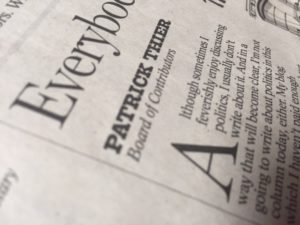You Can Say That Again!
I’ve been cursed with a profound fascination of words and how we use them.
Sure, when I happen to eloquently orate a soliloquy or transcribe a compelling composition—rare feats indeed—one may say I am blessed. But when friends and coworkers are interrupted with the correct usage or pronunciation, cursing usually follows.
The problem does not lie, however, in any gratification of being right or of anyone else being wrong, it lies in my never-ending quest for the truth. How does one pronounce Puyallup, for example? My belief systems and my education both point at the notion that a word has a specific intended pronunciation.
Imagine my chagrin, a Midwestern English major arriving in western Washington in the mid 1990’s. Back there, the names of town’s usually start with a name and ended with either “ton,” “burg,” or “ville.” As an example, I grew up on a farm near Dyersville; home to the movie Field of Dreams. A guy with the last name of Dyer started the community a long time ago. Within a 10 mile radius, there are towns like Colesburg, Earlville, Worthington, Bankston, Petersburg, Luxemburg; all easily and consistently pronounced.
Then a job takes me to Washington, just outside the city limits of Puyallup. Being the inquisitive perfectionist, I wanted to know the correct way to pronounce my new community. But I received almost as many different pronunciations as there were people answering! Not big differences, mind you; but just big enough to raise the ire of this verbal purist. Some would answer “pew-al-up.” Others would say “pew-all-up.” Then I’d hear “poo-yal-up,” and then “poo-yall-up.” The horror!
After 15 years, I thought I had it down. Then someone decided they had to change the name of Washington’s biggest carnival event to the “Washington State Fair,” and I no longer had that yearly educational jingle stuck in my head. The one that not only suggested how to say it, but how to “do” it.
After spending 40-something years with a name like Thier, which by the way rhymes with “deer” and has a soft “th,” I had to correct thousands of people on how to say it if they happened to read it first, and how to spell it if they happened to hear it first. It’s perhaps one good reason I am the way I am, and although my memory of names is horrific, my pronunciation of them is much better.
Take the name Dawn, for instance. Easy enough, right? That’s what I thought, until I met my wife. At the time there was a lovely associate named Dawn in the same real estate firm. Then I found out my then-girlfriend and I both had an uncle of the same name: Don. Can’t mess that up, right? Not so fast. My nearly-ousted girlfriend pronounced both names exactly the same! The horror!
Countless arguments ensued. Quickly, collaborators and arbitrators were gathered and their (not Thier) pronunciations were measured carefully against ours. I argued there was a huge difference in how you say the names. Gigantic; unlike the difference between ice cream and gelato, but that’s another argument.
I would ask her, “Dawn rhymes with lawn, right?” She would agree of course. And then I would ask, “And Don rhymes with Ron or the bon in Bon Marche’, right?” Still she would agree, normally something that wouldn’t add to my growing frustration. But to no avail. To this day, my wife, along with countless others I’ve discovered in the Pacific Northwest, pronounces the two names exactly the same.
Despite the fact that this particular quality ended up on the “con” (rhymes with Don) side of the page, where I actually did weigh carefully the pluses and minuses of a pending proposal, my wife taught me an important lesson that had nothing to do with verbal skills. Sometimes, however rare the occasion might be, it just doesn’t matter if we all pronounce words like “Don” exactly the same. It’s a lesson I’ve flunked over and over again, and still flunk to this day, but I acknowledge that there are bigger fish to fry. Like how to say Puyallup. Does it rhyme with dollop, or does it rhyme with gallop? Oh please don’t tell me they sound the same.
Perhaps my Linguistics professor from college should be impugned for my black and white outlook on pronunciation. After all, he would constantly demand of his students, “Soy it roit!”
Oh, by the way, my Linguistics professor was Scottish.

